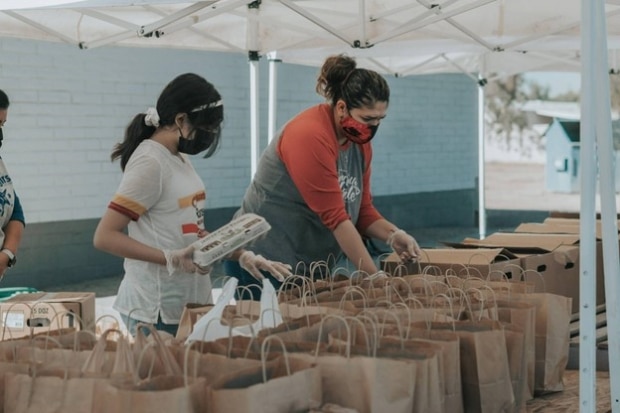What Are You Doing For Others?
One of the most important jobs of a parent is to be a leader. Both in the family and community. A good leader serves people. What are you doing for others?
A good leader is a servant –– someone who puts the well-being and growth of their group members first. A good leader is also a good follower who doesn’t let ego get in doing the right thing.
A good leader isn’t a totalitarian “my way or the highway” type of person. There are many ways to become a better parent through servant leadership:
- Learn and practice healthy communication
- Take on a service role in the local community
- Make yourself accessible to your family
- Prioritize service and generosity in your life and teach your children to do the same
- Hold yourself accountable to high standards of leadership
Servant leadership is the key to better mental health, happier families, and stronger communities. In the words of Dr. Martin Luther King Jr.: “Life’s most persistent and urgent question is, ‘What are you doing for others?’”
Get Involved
The first step of servant leadership is to get involved –– as an individual, parent, and member of the community. How are you working on yourself? How are you serving your family? How are you supporting the community?
Get Involved in Your Personal Growth
Reflexivity is a critical part of servant leadership. Before becoming a force of positive change in your family and community, you should become a force of positive change in your own life. Spend time getting to know yourself:
- What are your goals?
- What are your fears?
- What have you accomplished that you’re proud of?
- What have you done that you wish you could change?
- What are your strengths?
- What are your weaknesses?
- What are you doing to improve yourself?
- What are you doing for others?
As you spend more time getting to know yourself, building up your strengths, and correcting your weaknesses, your leadership capacity will grow. By holding yourself to high standards of behavior, you will also serve as a beacon of growth for your family and community.
Some of the best ways to improve yourself include investing in your physical and mental health, working hard to acquire new skills, practicing regular introspection, and studying the lives of great leaders who came before you.
Get Involved with Your Family
Once you’ve made discipline and personal growth significant focal points in your personal life, it’s time to pour energy into your family. You can do this by setting time aside to be with your children. Furthermore, you can prioritize listening, and harnessing teachable moments with compassion.
Spend some time with your partner and your children:
- Ask them how they’re doing
- Ask them about their goals
- Encourage them in the face of their fears
- Have fun with them in an environment of their choosing
- Work on projects around the home with them
- Assist them with homework and help them pursue healthy hobbies
By making yourself accessible to your family, you set an example of how to love and communicate. By listening and helping your children accomplish their goals, you demonstrate the core of servant leadership –– assisting people to reach the destination they seek instead of forcing people to conform to your plan.
Some of the best ways to spend time with family are eating meals together, reading together, playing outside games, gardening, or doing chores together. By inviting your children to perform acts of service by your side, you teach them the principles of servant leadership through demonstration and practice.
Get Involved with Your Community
After working on yourself and becoming a servant leader in your home, it’s time to serve your community. You can do this by getting involved in local volunteer projects, appearing at town hall meetings, and advocating for causes you believe in.
Spend some time using your skills and energy to build a stronger community:
- Volunteer to build or fix up homes for underprivileged members of the community
- Participate in food drives to serve local hungry families
- Participate in local politics by voting and encouraging others to do the same
- Help organize and run events for people of the community to gather together in celebration of holidays
- Attend events at the local library
- Support fundraisers at local schools
By becoming a pillar of the community, you will show your children how to impact the world around them positively. By working alongside and serving people who are different from you, you will teach your children about compassion and empathy.
Supporting Your Family
One of the most important jobs of a servant leader is to support the family. As a parent, you provide the primary example for your children to live appropriately. Your actions and decisions set the standard for healthy communication, positivity, connection, discipline, and self-care.
Good Communication
Healthy relationships begin with good communication. To communicate effectively with your children, seek to meet them where they are when speaking to them. Focus on using words they understand and confirm that they comprehend your messages by asking gently, “Do you understand what I mean?”
To foster healthy communication in the home, encourage your family members to talk to one another and to have a healthy conflict where they genuinely listen to each other and seek amicable solutions.
Respond sensibly to bad news and celebrate good news. Compromise when possible, and set firm boundaries when necessary. Use careful nonverbal communication to signal warmth and positivity, even if you are providing corrections –– it’s possible to discipline children firmly without becoming “the bad guy.” Deaf ears and an iron fist are a poor way to lead. Most importantly, listen to your family.
Positivity and Safety
When interacting with your family, seek to foster a positive and warm environment that feels safe. When children feel safe at home, they can rest, grow, and thrive.
To create a safe environment, use nonverbal cues like open body language, friendly eye contact, and smiles to welcome your family members into your presence at appropriate times. Seek moments to deliver praise for good behavior. Likewise, don’t be stingy with compassionate touch in the form of hugs or pats on the back.
Most importantly, make sure your family members know that you’ll always be there for them if they need you.
Familial Connection
One of the more essential things you must do as a parent is forge connections between your family and other healthy families. By interacting with role models and peers from different families, your children will develop empathy and compassion. Also, connecting with other families broadens your children’s network with healthy connections.
Volunteering alongside other families is a great way to build connections. So is scheduling community events like birthday parties or holiday celebrations.
In addition to connecting with other families, work to help your children connect with their extended families. Grandparents, uncles, aunts, and cousins can be excellent teachers.
Consistency
Family routines and consistent boundaries are critical to healthy development. Routines help children cultivate discipline, and boundaries help children develop an internal compass of right and wrong.
Part of creating an environment of consistency is holding yourself accountable. If your children see you engaging in the behaviors you forbid them to engage in, they may decide to emulate you behind your back.
A great way to instill good values in your children is to have regular family gatherings where you encourage your children to seek your advice. Eventually, where you involve them in certain types of family decision-making. You can allow them to have occasional input on what to serve for dinner or what movie to watch on family movie night.
Self-Care
Self-care is an essential part of a healthy, successful life. And it’s a skill best learned and practiced often in childhood. You must teach your children to discern between healthy food and junk food, trustworthy friends and toxic acquaintances, responsible behavior, and irresponsible behavior.
Teach your children how to dress well, maintain good posture, eat healthy food, and maintain an exercise routine. Teach them to stand tall when they walk in public and stand up for themselves when someone tries to take advantage of them.
Most importantly, by instilling a strong sense of self-worth and a routine of self-care in your children, you will set them up for success after they finally leave the nest.
What Children Can Learn From Giving
One of the best ways to get involved in the community is giving time, money, and energy to worthy causes. Generosity is an excellent form of community service. By learning it early, children develop kindness, empathy, and life skills that will set them up for success later in life.
Kindness
In today’s digital world, we interact with many people through screens, either on social media, through email, or phone and video calls. As a result, children have fewer opportunities to forge organic connections with others. While a phone call is nice, there’s nothing quite like seeing how a single act of kindness can light up someone’s face with a joyful smile.
When children give, they learn that being kind to others feels good. These early giving experiences can help children prioritize kindness in their lives as they grow into adults who will one day change the world.
Life Skills
To practice giving, children must hone a variety of life skills –– communication, hard work, selflessness, and big-picture thinking. Giving helps children understand the importance of working hard and providing a helping hand whenever possible.
To succeed, children must learn to take broad perspectives on complicated issues, cultivate discipline, connect with others, and think critically. Giving gives children the opportunity to think about how the fruits of their hard work can be best leveraged to help the people around them.
Empathy
One of the most essential qualities of a successful person is empathy. To build a successful career, family, or business, a person must be able to understand and communicate with others. By teaching your children to give, you also provide them an opportunity to think about the needs and desires of others.
By learning to relate to other people, children will better understand their strengths and weaknesses. This will help them better position themselves to serve their communities as adults.
Family-Friendly Ways to Give
There are many ways to give. You can support fundraisers, volunteer in community projects, donate to worthy causes, etc.
Fundraising
Participating in a fundraiser is an excellent way to teach children to give and have fun at the same time. Once per year, you could have every family member choose a fundraiser to support that aligns with your family values. Afterward, you could have the whole family compete to raise the most funds and reward the winner with a fancy dinner out.
Hands-On Community Service
Another great way to give is through hands-on community service. You can work with other families to clean litter off of roadways. Similarly, if your children are older, you can involve them in a tutoring program where they help younger children learn.
Donations
One of the best ways to teach children to give is by encouraging them to donate to worthy causes. If your children earn an allowance for doing chores, you could make them save 10% of their allowance each month to donate to a charity of their choice.
Good Parenting Starts with Servant Leadership
In conclusion, to be a good parent, you must learn to be a servant leader. It’s your job to teach your children how to become successful, productive, generous members of the global community even after you’re gone.
By committing to serving others, you can ensure that the memories your children have of you are good ones –– full of love and learning. Here’s how you can keep the connection with your teen.






